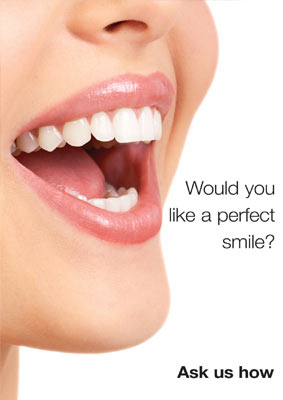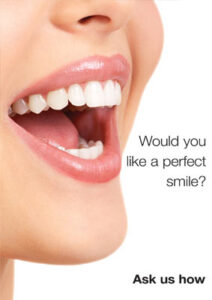Unfortunately, it is common to have phonetic changes in speech after having new dental crowns, veneers or dentures fitted.
This is due to the fact that a new shape is now at the front of your mouth formed by the new crowns, bridgework, veneers or denture, altering the way your voice sounds, and the way some words are produced.
Some dental patients complain of slight slurring, hissing, lisping, spitting and problems with the sounds “th” “f” and “s”.
Usually, this is minor and slight and only audible to the person who has had the dental treatment, in severe cases, it can be audible to others too who are used to your normal way of speaking.
However, these symptoms in the majority of cases reside in a few weeks when the brain gradually “re-wires” and gets used to the new shape.
In some particular cases, the problem may be that your new top or bottom crowns are not in the correct spatial relationship to your lower or top front teeth yet, and the lower or top teeth are still needed to be worked on.
Even Freddie Mercury, the renowned singer from the music group “Queen” considered having cosmetic dentistry on his unsightly upper front teeth.
Freddie decided against it when he discovered that the shape of his teeth was one of the keys to his spectacular vocal sound and voice projection when singing.
One way to speed up the process and return to normal speech is to practise reading aloud alone, articulating every work for at least 15 minutes every day. This will give your brain an opportunity to “reconnect” with your vocal sounds, without ridicule from others, and match your new voice with your new smile.
It’s always best to work with dentists such as those at Dental Holiday who have substantial experience in dentures, full mouth makeovers and reconstructive dentistry that involves replacement or modification of anterior teeth through crowns, bridgework or implants.
This video I recorded might also be useful:



THANK YOU,THANK YOU!!!!
you have me hope!!! Im a female, 38 yrs old. all my life I would never smile in pictures because my front teeth were soooo bad. I conceder myself an attractive women but when i would smile it was like yuck!!! lol!! so finally I was able to get my teeth done. they removed the 4 upper teeth and replaced with a bridge. I look beautiful!!!! super happy!! but my speech is not so great. I think I sound a little funny, and some words hard to pronounce and a slight lisp. so now I have a “new self conscious” thing going on. Im going to try reading 15 mins a day like you say, hope it works.
Keep on practising Erica, and if nothing changes, be sure to visit the original dentist who did the work once again for adjustments…
I wish it would be this easy.
It’s been 1 year and a half with 4 top frontal top veneers on, tried many adjustments during this time, even got new veneers on with another dentist, and the speech issues are still here. Hissing and whistling “S” and “TH”, that’s the problem. This makes me paranoid, even lost my interest for singing and languages, two passions I have.
Hi Rene, have you seen a lingual specialist?
Yes, I have.
She suggested some exercises but it didn’t really help. After some time of therapy and no solid results, she started trying to convince me that the S sound was ok. But it isn’t, it sounds weird to me. It’s like playing a guitar with a string out of tune!
Maybe I’ll get back to the dentist and try making my teeth short and thin (on the back), as they were before.. If I have to choose between looking and functionality of speech, I’ll choose functionality. Do you think it would help if I got my tooth back to the shape and size it was before? Sometimes I wonder if this high pitched S sound is because of the material itself (porcelain).
I’m afraid that changing the shape and size will change the sound again, but differently, and probably not in a way that you’d like. The porcelain material shouldn’t really come into play here, as it’s the vocal chords, tongue and air passing through the oral cavity & throat that produces sound…
But if it is not the material, so getting the shape and size back to what it was before should help!
I mean, it’s a huge difference and I just can’t get it out of my mind, it annoys me in every sentence I speak. I just can’t take it cos it does sound very weird.
As for the material come into play or not, that’s the only conclusion I can get to, since nothing seems to fix it. Also because many people who have dentures and veneers/crowns sound exactly the same way as I do, with an artificial whistle that sounds really ugly. If you want to know what I mean, have a look on this video, see how the woman sounds. She probably has dentures. I don’t sound as bad as she does but it’s the same type of sound. http://www.youtube.com/watch?v=1XY_9AxenM0
I believe every material would produce a different sound.. imagine rubber veneers or wooden veneers for example.. they would surely sound differently.
Anyway, I have brackets on at the moment (only for this reason, to try to fix this) and if it doesn’t work, I will try re-sizing and re-shaping, changing to composite veneers, whatever is necessary!
On the post, it says “In some particular cases, the problem may be that your new top or bottom crowns are not in the correct spacial relationship to your lower or top front teeth yet”.
What exactly are the correct spacial relationships? Is there any guide about proper inclination, angle, incision edge dimensions or something like this?
Is there any book I can find to have this sort of information? I need to solve my problem and I’m willing to do anything for that, I’ll be glad if you can help me! Thank you
The correct spacial relationship is something that cosmetic dentists learn in University (hopefully before they start doing crowns & veneers), however a lingual or speech specialist should be more approachable and be able to offer more advice if you can find one locally…
I too am facing the same problemmin pronouncing some words after I got bridges for six frontal lower teeth. I too am frustrated as I have great passion for languages. The vent is yet not filled despite the passage of almost one year.
Dear Intaj,
We would recommend to visit the dentist who did the work, and ask him to adjust the bridge according to your needs.
I hope this helps
Regards
due to radiation cant have implants or teeth removed. used to speak and read at church. most of my friends and spouse cant understand me frequently. side effects of cancer but survived so thankful Just have to speak slowly and learn how to pronounce certain letters with front bridge.
I had four back teeth removed and two implants put in. I have a temp partial (waiting for
my permanent snap in partial) and since I have had this done I cannot speak clearly.
The doctor said I will get used to speaking with time but it has been 4 months and I still have excessive slavia/speaking difficulty. I am frustrated and don’t know what to do.
Hi Linda, hopefully your permanent partial denture will be formed better so that your voice rectifies itself again. Certainly the original dentist who’s doing the work should be able to help you the most with solving this problem.
I got my crowns, entire mouth. I have a problems which are really annoying. When I speak my cheeks are puffing as the sail and, I have to swallow saliva often. Plus, I feel a pressure on my upper lip by two front incisors. As the result of that , my upper lip became less mobile during the speech . I feel my my upper arch is too wide and as the result I have this puffing cheeks. Another issue is that right after my permanent crowns were applied to my front incisors, I started to feel hot and cold and this feeling did not subsided for more that a month. I did not have this sensitivity with temporary crowns and suddenly I got it with permanent ones. I do not have any inflammation or pain, just cold/hot sensitivity. If any of these issue can be resolved?
Hi Irina – thanks for writing. May I ask how long ago was all this work done? The sensitivity sounds typical and should subside over time – if not you might want to get it checked that the crowns fully align with the gumline so that no hot/cold liquid can get beneath them. Here there are many techniques used to bring the gums to the gumline for aesthetic reasons, that might be a way forward rather than replacing the crowns. As for the whole arch and the speech problems that does sound unusual. Unfortunately, there’s no easy solution rather than waiting to see if you can get used to it, or having a bite check/readjustment with the dentist who did the crowns originally.
I have had my complete immediate dentures since Saturday and it’s Wednesday. It still sounds like I have a 1lb of gauze stuck in my mouth. Is this normal it’s not a lisp, it’s not s’s or c’s it’s all words and I am thinking the upper roof plate maybe too thick.
Hi Christopher,
As I’m not aware of the clinic you visited or the country (feel free to let us know if you want) but may I ask, are those fixed dentures on implants, removable dentures or simply a temporary denture made to wear until your final bridgework is complete?
If they are not fixed – it’s quite typical to have this feeling until you have permanent, fixed bridgework in your mouth.
I have the same problem with speech after all on six top and bottom. I was not prepared for this problem. My dentist assured me on my first consultation that my speech would not be affected as they were fixed teeth. I found the temporary teeth much better than the permanent teeth. I hiss and pronounce things funny, I spit at times which is so embarrassing. My teeth feel too big for my mouth. My lip is a bit droopy on one site and my mouth feels weird when I speak. I try and correct it by reading aloud and I sing loud when pottering about the house or driving, but nothing works. I am so disappointed and totally unprepared for this. My dentist dose not appear to listen to me and just fobs me off. I feel I might have to go for a second opinion which is additional cost.. I paid over £32,000 and expect to be able to speak properly. I am trying to put the words I find difficult into sentence and read it over and over aloud and hopefully it might help. I hate to feel of them in my mouth. It’s feel like someone else’s teeth. I sometimes wonder if they gave me someone else’s teeth lol, but I mean it. Nothing would surprise me.
Dear Joseph,
I’m sorry to hear that you’re experiencing these issues after your All-on-6 dental procedure. I’m unaware of the clinic you visited, but addressing your concerns is crucial to ensure your comfort and satisfaction with your new teeth. Here are a few steps you can take:
Communicate your concerns: Schedule an appointment with your dentist to express your concerns and discuss the issues you’re experiencing. Clearly outline your speech difficulties, the feeling of the teeth being too large, and any other discomfort you face.
Seek a second opinion: If you feel your dentist isn’t adequately addressing your concerns, it’s essential to seek a second opinion from another dental professional experienced in All-on-6 procedures. They can assess your situation and offer recommendations on how to proceed.
Speech therapy: In some cases, speech therapy can help patients adjust to their new teeth and improve speech issues. A speech therapist can work with you to develop exercises and techniques to overcome any speech difficulties you’re experiencing.
Adjustments: Depending on the cause of the problem, your dentist or a specialist might need to make adjustments to your prosthesis. This could involve reshaping or resizing the teeth to fit your mouth better and alleviate discomfort.
Give yourself time: It can take some time for patients to adjust to the feel of their new teeth. Continue practising speaking and singing aloud to help your mouth and muscles adapt to the new situation.
Wishing you the best in resolving these issues and achieving the comfort and function you deserve.
What helps me a bit when speaking with all on 4 top and bottom. When I chew gum I stick the gum with my tongue
at the back of the top bridge and it stops the air flow and helps the speech. It’s easy to remove the gum after you finish your conversation. I use this trick if speaking on the phone. I have to sound professional on the phone when working and it’s so difficult to speak for a long time. I was totally unprepared for this problem. I am following the doctors advice above and I appreciate him,her taking the time to respond and what he/she said makes senses . Maybe I am too inpatient, but I do feel my dentist should have prepared me for this. So far my permanent teeth are no better that the temps. Thanks everyone for sharing your experiences on here. It’s given me some hope that I am not the only one that is having speech issues. Good luck everyone and hope things improve for us all.🙏🏽🙏🏽🙏🏽
Thank you for sharing your personal experience and creative solution for managing speech issues with all on 4 dental implants. It’s great to hear that this gum trick has helped you professionally. Understandably, you may feel unprepared for these challenges, but your dedication to finding solutions and willingness to follow your dentists’ advice is commendable.
I’m glad you’ve found comfort in knowing you’re not alone in dealing with these issues. Remember that patience and persistence often pay off in the long run. Keep up the positive attitude, and good luck on your journey! 🙏🏽✨